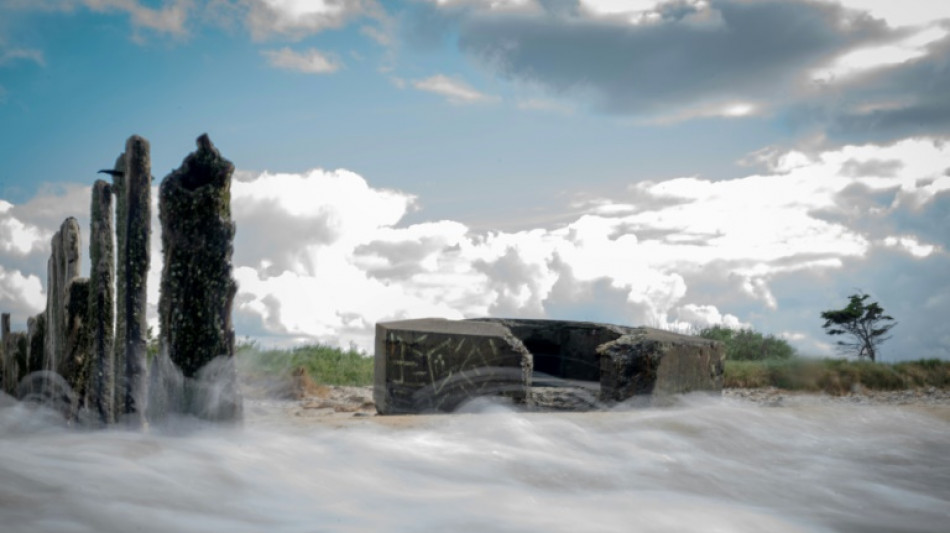
-
 Men's Fashion Week kicks off in Paris with tributes for Valentino
Men's Fashion Week kicks off in Paris with tributes for Valentino
-
Lake named as captain as Wales unveil Six Nations squad

-
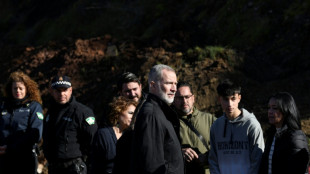 Royals visit deadly train crash site as Spain mourns
Royals visit deadly train crash site as Spain mourns
-
Police, pro-Kurd protesters clash at Turkey border with Syria

-
 Thai forces razed Cambodian homes on border: rights group
Thai forces razed Cambodian homes on border: rights group
-
Jellyfish-inspired Osaka battles into Australian Open round two

-
 Valentino taught us to respect women, says partner
Valentino taught us to respect women, says partner
-
Australia stiffens hate crime, gun laws after Bondi attack
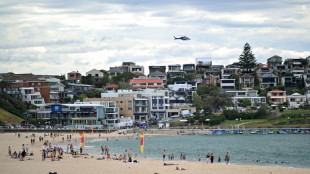
-
 Mercedes chief designer Owen to leave F1 team
Mercedes chief designer Owen to leave F1 team
-
Trump unloads on allies as Davos showdown looms

-
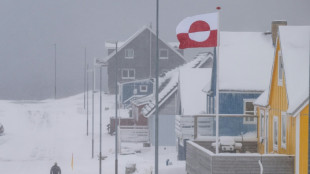 Moscow revels in Trump's Greenland plans but keeps concerns quiet
Moscow revels in Trump's Greenland plans but keeps concerns quiet
-
Global tourism hit new record level in 2025: UN
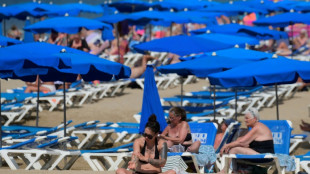
-
 Senegal poised to party with parade honouring AFCON champs
Senegal poised to party with parade honouring AFCON champs
-
Osaka emerges for Melbourne opener under hat, veil and parasol

-
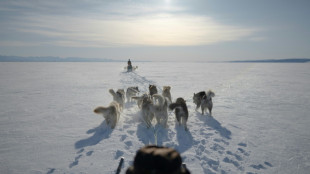 Dogsled diplomacy in Greenland proves elusive for US
Dogsled diplomacy in Greenland proves elusive for US
-
Almost half of Kyiv without heat, power, after Russian attack

-
 EU vows 'unflinching' response to Trump's Greenland gambit
EU vows 'unflinching' response to Trump's Greenland gambit
-
Osaka steals show at Australian Open as Sinner strolls through

-
 Brignone impresses in first run of Kronplatz giant slalom in World Cup comeback
Brignone impresses in first run of Kronplatz giant slalom in World Cup comeback
-
Osaka emerges for Melbourne opener under white hat and umbrella

-
 Malawi suffers as US aid cuts cripple healthcare
Malawi suffers as US aid cuts cripple healthcare
-
Bessent says Europe dumping US debt over Greenland would 'defy logic'

-
 Freeze, please! China's winter swimmers take the plunge
Freeze, please! China's winter swimmers take the plunge
-
Talks between Damascus, Kurdish-led forces 'collapse': Kurdish official to AFP

-
 In-form Bencic makes light work of Boulter at Australian Open
In-form Bencic makes light work of Boulter at Australian Open
-
Spain mourns as train disaster toll rises to 41

-
 Sinner into Melbourne round two as opponent retires hurt
Sinner into Melbourne round two as opponent retires hurt
-
Israel begins demolitions at UNRWA headquarters in east Jerusalem
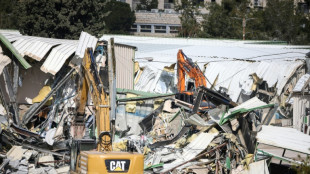
-
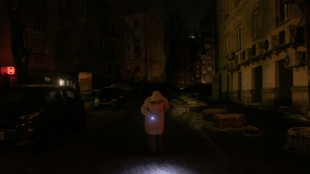 Almost half of Kyiv without heat, power, after Russian attack: govt
Almost half of Kyiv without heat, power, after Russian attack: govt
-
Veteran Monfils exits to standing ovation on Australian Open farewell

-
 Precision-serving former finalist Rybakina powers on in Melbourne
Precision-serving former finalist Rybakina powers on in Melbourne
-
South Korea's women footballers threaten boycott over conditions

-
 Equities sink, gold and silver hit records as Greenland fears mount
Equities sink, gold and silver hit records as Greenland fears mount
-
Australian lawmakers back stricter gun, hate crime laws
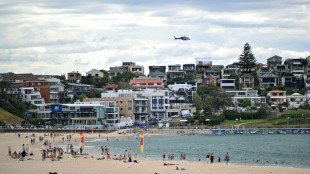
-
 EU wants to keep Chinese suppliers out of critical infrastructure
EU wants to keep Chinese suppliers out of critical infrastructure
-
AI reshaping the battle over the narrative of Maduro's US capture

-
 Penguins bring forward breeding season as Antarctica warms: study
Penguins bring forward breeding season as Antarctica warms: study
-
Vietnam leader pledges graft fight as he eyes China-style powers

-
 Ukrainian makes soldier dad's 'dream come true' at Australian Open
Ukrainian makes soldier dad's 'dream come true' at Australian Open
-
'Timid' Keys makes shaky start to Australian Open title defence

-
 Indiana crowned college champions to complete fairytale season
Indiana crowned college champions to complete fairytale season
-
South Koreans go cuckoo for 'Dubai-style' cookies

-
 Harris leads Pistons past Celtics in thriller; Thunder bounce back
Harris leads Pistons past Celtics in thriller; Thunder bounce back
-
Tjen first Indonesian to win at Australian Open in 28 years

-
 Long-delayed decision due on Chinese mega-embassy in London
Long-delayed decision due on Chinese mega-embassy in London
-
Djokovic jokes that he wants slice of Alcaraz's winnings

-
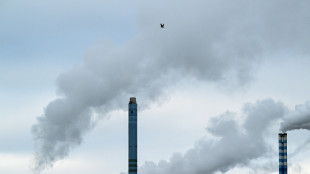 Trump tariff threat 'poison' for Germany's fragile recovery
Trump tariff threat 'poison' for Germany's fragile recovery
-
Tourists hit record in Japan, despite plunge from China

-
 Jittery Keys opens Melbourne defence as Sinner begins hat-trick quest
Jittery Keys opens Melbourne defence as Sinner begins hat-trick quest
-
The impact of Trump's foreign aid cuts, one year on
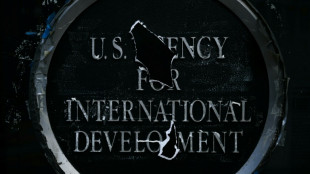

France's historic D-Day beaches threatened by rising sea levels
As France prepares to mark 80 years since Allied forces landed on the beaches of Normandy, the historic coastline faces a new threat -- rising sea levels linked to climate change.
More than 100 kilometres (62 miles) of Normandy's coastline bear traces of June 6, 1944, including bunkers, shipwrecked vessels, and other vestiges from the Allied troops' first step to freeing western Europe from Nazi German occupation.
But now, the sea from which 150,000 Allied troops conducted the largest seaborne invasion in history threatens those same heritage sites.
Rising sea levels are eroding dunes and cliffs, while marshes and reclaimed land risk submersion at sites visited by millions each year.
The famed beaches –- code-named Utah, Omaha, Juno, Sword and Gold –- that were stormed by US, British Commonwealth and other allied troops have all drastically changed in 80 years.
The D-Day sites "already bear no resemblance to what Allied soldiers experienced on June 6, 1944", said Regis Leymarie, a geographer with the Coastal Conservatory in Normandy.
"We're in the process of moving from historic sites to places for interpreting history," he added.
And changes are coming fast.
Rising global sea temperatures are accelerating the melting of polar ice caps and increasing sea levels, posing a threat to Normandy's coastal communities.
"The environment will be transformed in 10 years or so," said Leymarie.
– 'We don't have any help'-
For some communities, these changes are already here.
In Graye-sur-Mer, a village along Juno Beach, the sea has toppled entire bunkers, leaving local residents worried that history is being swept out with the tide.
And yet, few town councils are prepared to take action.
Of the 15 or so contacted by AFP in recent months, fewer than half have replied.
Three others said they would not be "affected" or even "threatened" in the near future.
Charles de Vallavieille, the mayor of Sainte-Marie-du-Mont and director of the Utah Beach Museum, disagreed.
"(There are) difficulties. We must not deny them," he said.
Standing in front of the museum founded by his father in 1962, de Vallavieille recalled watching former soldiers return to Normandy.
"I've seen veterans waving to the sea, crying... It’s the emotion of the beach," de Vallavieille said.
He said these sites should be protected but that there are limitations to actions local leaders can take, adding: "We don’t have the right to do anything".
"We don't have any help even though it's a problem that affects the whole coast –- protect one place and the water will go elsewhere."
–'Coming to the end'-
Located between the American and British landing sites, the Bessin cliffs, which were the site of a daring vertical assault by US Army Rangers, have not been spared.
Several German artillery batteries stood on these hard-to-reach outcrops, including the famed Pointe du Hoc, which attracts some 500,000 visitors a year.
Ascending the 25-metre (82-foot) cliff face in foul weather and under German fire, only 90 of the 225 attackers escaped unharmed.
Managed by the American Battle Monuments Commission (ABMC), the site is very fragile and partially collapsed in 2022.
ABMC said it had taken several steps to "secure the area", including installing reinforced concrete walls and sensors to detect significant movement.
The agency also moved paths back 20 metres to ensure public safety.
For Normandy conservation official Leymarie, the only thing left to do is adapt to the coming changes.
Sea levels are currently rising by a few millimetres a year.
"It's only over two or three generations that we become aware of it," he said.
"We're coming to the end of the D-Day landing sites as we knew them," Leymarie said.
"And nature will reclaim its right."
D.Schlegel--VB



